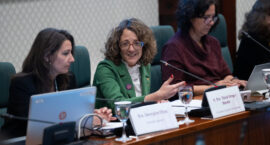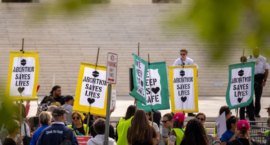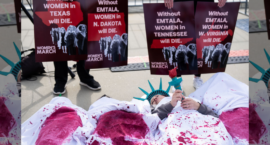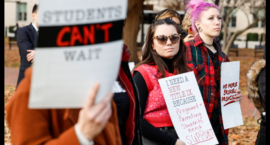I am one of an estimated 5 to 6 million women in the U.S. with polycystic ovary syndrome (PCOS)—the most common cause of infertility. PCOS is a difficult disease to manage and a direct threat to my chances of bringing life into this world. But my fear isn’t about not being able to get pregnant—it’s about being pregnant in a country without Roe v. Wade.
Category: Health
An Introduction to Catalonia’s Feminist Administration
For many decades, sexual and reproductive rights have been at the core of the global feminist struggle—but only an unapologetically feminist administration puts them at the center of the political agenda. Such is the progressive turn the government of Catalonia, an autonomous region in northeastern Spain, assumed in May 2021 when it created a Ministry of Equality and Feminisms.
In October 2021, this new ministry drafted the national strategy for sexual and reproductive rights. This was founded on the premise that the personal is political, so it must also be public policy. This strategy sought to guarantee the effective exercise of existing rights—particularly abortion, long-term contraception and sexuality education.
Many women are now asking: What about perimenopause, menopause and post-menopause?
Arizona Women Gear Up to Challenge Near-Total Abortion Ban in Upcoming Election
Tuesday, April 9, 2024, will go down in history. It is the day that far-right extremists got what they wanted in Arizona: a near-total ban on abortion. It is the day the Arizona Supreme Court turned the clock back 160 years—to a time before women could vote and before Arizona was even a state. It is a day that we will look back on with shame and horror. Like so many Arizona moms, my first thought was of my daughter, who was born last July in a post-Roe America.
While we cannot snap our fingers and change the dynamic at the U.S. or Arizona Supreme Court, we can make our voices heard at the ballot box. Come November, Arizona women are going to come out in full force to vote for our right to control our own bodies.
Arizona’s 1864 Abortion Law Was Made in a Women’s Rights Desert. Here’s What Life Was Like Then.
In 1864, Arizona—which was an official territory of the United States—was a vast desert. Women in Arizona could not vote, serve on juries or exercise full control over property in a marriage. They had no direct say in laws governing their bodies. Hispanic and African American women had even fewer rights than white women.
The Arizona Supreme Court ruled on April 9, 2024, that a 160-year-old abortion ban passed during this territorial period will go into effect. Since that ruling, the Arizona legislature has been grappling with how to handle the near-total ban. Even if the ban is fully repealed, it could still take temporary effect this summer.
As someone who teaches history in Arizona and researches slavery, I think it is useful to understand what life was like in Arizona when this abortion ban was in force.
Can Idaho ‘Force Someone Onto a Helicopter’ as the Standard of Medical Care for Accessing Health-Stabilizing Abortions?
In the wake of Dobbs, while most abortion-restrictive states have maintained an exception to preserve the health of the pregnant woman, a handful of ban states—including Idaho—no longer permit abortions needed to protect a pregnant person’s health. The Biden administration says this is in direct conflict with the federal statute EMTALA.
Solicitor General Elizabeth Prelogar encapsulated what Justice Sotomayor referred to as the “big daylight” between the two laws: “In Idaho, doctors have to shut their eyes to everything except death—whereas, under EMTALA, you’re supposed to be thinking about things like: Is she about to lose her fertility? Is her uterus going to become incredibly scarred because of the bleeding? Is she about to undergo the possibility of kidney failure?”
‘Tragedy Upon Tragedy’: What the Justices’ Questions on EMTALA Revealed
The narrowing of options for physicians in Idaho leaves them in a bind: Do you perform an abortion that could save a woman’s life or her organs, as dictated by EMTALA, or will you face penalties under Idaho law?
Oral arguments can sometimes reveal how the justices of the Supreme Court are approaching the issue at hand. The questions asked by the justices suggest three things: a lack of clarity under Idaho law; abortion as the standard of care; and acknowledgement of fetal personhood.
Will the Supreme Court Dump Women’s Lives and Futures *Again*?
We’ve come to the point in post-Dobbs America where the legal system, and the nation’s highest Court, are now entertaining questions about how long is too long for a woman to have to wait to receive emergency care when her organs—including her reproductive organs—are in danger.
Will women again be failed by this Court? Or will the justices finally be able to look at the devastation they have caused to women and families and not blink?
Nine Need-to-Know Changes From the New Title IX Rules
The United States Department of Education released its much-anticipated amendments to the existing Title IX regulations—which prohibits discrimination on the basis of sex in any education program or activity that receives federal financial assistance.
The amendments make substantial changes to the existing Title IX regulations. Experts anticipate these new changes will result in an increase in the number of Title IX complaints, since they broaden the protections of Title IX. The Education Department is requiring all schools implement the new 2024 regulations by Aug. 1.
Here are nine significant changes to Title IX that interested parties in higher education should know.
Medical Records for Out-of-State Abortions Will Now Be Protected by HIPAA
Healthcare providers aren’t allowed to tell law enforcement about a patient’s abortion if they received the procedure in a state where it is legal, it is protected by federal law, or it is permitted by state law, the Biden administration said Monday. The rule will take effect in 30 days, and it represents a meaningful shift.
But it’s unclear whether it will protect medical data for people who self-manage their abortions by receiving medication in the mail, often from a prescribing physician in a state with laws protecting reproductive rights.
When It Comes to Abortion Bans, ‘Life of the Mother’ Exceptions Are a Lie
This Wednesday, Idaho will attempt to defend its extreme abortion ban at the Supreme Court. Like many other abortion bans in the United States, the Idaho law contains a so-called life exception, which purports to allow an abortion when “necessary to prevent the death” of the pregnant person.
But do these exceptions actually preserve the lives of patients in practice? As Mayron Hollis, Amanda Zurawski, the family of Yeniifer Alvarez-Estrada Glick, and countless other women can attest, the answer is no. And the truth is, they’re not designed to.












